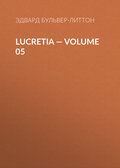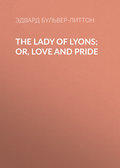
Эдвард Бульвер-Литтон
Pelham — Complete
CHAPTER XLII
Tout notre mal vient de ne pouvoir etre seuls; de la le jeu, le luxe, la dissipation, le vin, les femmes, l'ignorance, la medisance, l'envie, l'oubli de soi-meme et de Dieu.
—La Bruyere.
The next day I resolved to call upon Tyrrell, seeing that he had not yet kept his promise of anticipating me, and being very desirous not to lose any opportunity of improving my acquaintance with him; accordingly, I sent my valet to make inquiries as to his abode. I found that he lodged in the same hotel as myself; and having previously ascertained that he was at home, I made up my features into their most winning expression, and was ushered by the head waiter into the gamester’s apartment.
He was sitting by the fire in a listless, yet thoughtful attitude. His muscular and rather handsome person, was indued in a dressing-gown of rich brocade, thrown on with a slovenly nonchalance. His stockings were about his heels, his hair was dishevelled, and the light streaming through the half-drawn window-curtains, rested upon the grey flakes with which its darker luxuriance was interspersed, and the cross light in which he had the imprudence or misfortune to sit (odious cross light, which even I already begin carefully to avoid), fully developed the deep wrinkles which years and dissipation had planted round his eyes and mouth. I was quite startled at the oldness and haggardness of his appearance.
He rose gracefully enough when I was announced; and no sooner had the waiter retired, than he came up to me, shook me warmly by the hand, and said, “Let me thank you now for the attention you formerly shewed me, when I was less able to express my acknowledgments. I shall be proud to cultivate your intimacy.”
I answered him in the same strain, and in the course of conversation, made myself so entertaining, that he agreed to spend the remainder of the day with me. We ordered our horses at three, and our dinner at seven, and I left him till the former were ready, in order to allow him time for his toilet.
During our ride we talked principally on general subjects, on the various differences of France and England, on horses, on wines, on women, on politics, on all things, except that which had created our acquaintance. His remarks were those of a strong, ill-regulated mind, which had made experience supply the place of the reasoning faculties; there was a looseness in his sentiments, and a licentiousness in his opinions, which startled even me (used as I had been to rakes of all schools); his philosophy was of that species which thinks that the best maxim of wisdom is—to despise. Of men he spoke with the bitterness of hatred; of women, with the levity of contempt. France had taught him its debaucheries, but not the elegance which refines them: if his sentiments were low, the language in which they were clothed was meaner still: and that which makes the morality of the upper classes, and which no criminal is supposed to be hardy enough to reject; that religion which has no scoffers, that code which has no impugners, that honour among gentlemen, which constitutes the moving principle of the society in which they live, he seemed to imagine, even in its most fundamental laws, was an authority to which nothing but the inexperience of the young, and the credulity of the romantic, could accede.
Upon the whole, he seemed to me a “bold, bad man,” with just enough of intellect to teach him to be a villain, without that higher degree which shews him that it is the worst course for his interest; and just enough of daring to make him indifferent to the dangers of guilt, though it was not sufficient to make him conquer and control them. For the rest, he loved trotting better than cantering—piqued himself upon being manly—wore doe-skin gloves—drank port wine, par preference, and considered beef-steaks and oysters as the most delicate dish in the whole carte. I think, now, reader, you have a tolerably good view of his character.
After dinner, when we were discussing the second bottle, I thought it would not be a bad opportunity to question him upon his acquaintance with Glanville. His countenance fell directly I mentioned that name. However, he rallied himself. “Oh,” said he, “you mean the soi-disant Warburton. I knew him some years back—he was a poor silly youth, half mad, I believe, and particularly hostile to me, owing to some foolish disagreement when he was quite a boy.”
“What was the cause?” said I.
“Nothing—nothing of any consequence,” answered Tyrrell; and then added, with an air of coxcombry, “I believe I was more fortunate than he, in an affaire du coeur. Poor Granville is a little romantic, you know. But enough of this now: shall we go to the rooms?”
“With pleasure,” said I; and to the rooms we went.
CHAPTER XLIII
Veteres revocavit artes.
—Horace.
Since I came hither I have heard strange news.
—King Lear.
Two days after my long conversation with Tyrrell, I called again upon that worthy. To my great surprise he had left Cheltenham. I then strolled to Vincent: I found him lolling on his sofa, surrounded, as usual, with books and papers.
“Come in, Pelham,” said he, as I hesitated at the threshold—“come in. I have been delighting myself with Plato all the morning; I scarcely know what it is that enchants us so much with the ancients. I rather believe, with Schlegel, that it is that air of perfect repose—the stillness of a deep soul, which rests over their writings. Whatever would appear common-place amongst us, has with them I know not what of sublimity and pathos. Triteness seems the profundity of truth—wildness the daring of a luxuriant imagination. The fact is, that in spite of every fault, you see through all the traces of original thought; there is a contemplative grandeur in their sentiments, which seems to have nothing borrowed in its meaning or its dress. Take, for instance, this fragment of Mimnermus, on the shortness of life,—what subject can seem more tame?—what less striking than the feelings he expresses?—and yet, throughout every line, there is a melancholy depth and tenderness, which it is impossible to define. Of all English writers who partake the most of this spirit of conveying interest and strength to sentiments, subjects, and language, neither novel in themselves, nor adorned in their arrangement, I know none that equal Byron; it is indeed the chief beauty of that extraordinary poet. Examine Childe Harold accurately, and you will be surprised to discover how very little of real depth or novelty there often is in the reflections which seem most deep and new. You are enchained by the vague but powerful beauty of the style; the strong impress of originality which breathes throughout. Like the oracle of Dodona, he makes the forest his tablets, and writes his inspirations upon the leaves of the trees: but the source of that inspiration you cannot tell; it is neither the truth nor the beauty of his sayings which you admire, though you fancy that it is: it is the mystery which accompanies them.”
“Pray,” said I, stretching myself listlessly on the opposite sofa to Vincent, “do you not imagine that one great cause of this spirit of which you speak, and which seems to be nothing more than a thoughtful method of expressing all things, even to trifles, was the great loneliness to which the ancient poets and philosophers were attached? I think (though I have not your talent for quoting) that Cicero calls the consideratio naturae, the pabulum animi; and the mind which, in solitude, is confined necessarily to a few objects, meditates more closely upon those it embraces: the habit of this meditation enters and pervades the system, and whatever afterwards emanates from it is tinctured with the thoughtful and contemplative colours it has received.”
“Heus Domine!” cried Vincent: “how long have you learnt to read Cicero, and talk about the mind?”
“Ah,” said I, “I am perhaps less ignorant than I affect to be: it is now my object to be a dandy; hereafter I may aspire to be an orator—a wit, a scholar, or a Vincent. You will see then that there have been many odd quarters of an hour in my life less unprofitably wasted than you imagine.”
Vincent rose in a sort of nervous excitement, and then reseating himself, fixed his dark bright eyes steadfastly upon me for some moments; his countenance all the while assuming a higher and graver expression than I had ever before seen it wear.
“Pelham,” said he, at last, “it is for the sake of moments like these, when your better nature flashes out, that I have sought your society and your friendship. I, too, am not wholly what I appear: the world may yet see that Halifax was not the only statesman whom the pursuits of literature had only formed the better for the labours of business. Meanwhile, let me pass for the pedant, and the bookworm: like a sturdier adventurer than myself, ‘I bide my time.’—Pelham—this will be a busy session! shall you prepare for it?”
“Nay,” answered I, relapsing into my usual tone of languid affectation; “I shall have too much to do in attending to Stultz, and Nugee, and Tattersall and Baxter, and a hundred other occupiers of spare time. Remember, this is my first season in London since my majority.”
Vincent took up the newspaper with evident chagrin; however, he was too theoretically the man of the world, long to shew his displeasure. “Parr—Parr—again,” said he; “how they stuff the journals with that name. God knows, I venerate learning as much as any man; but I respect it for its uses, and not for itself. However, I will not quarrel with his reputation—it is but for a day. Literary men, who leave nothing but their name to posterity, have but a short twilight of posthumous renown. Apropos, do you know my pun upon Parr and the Major?”
“Not I,” said I, “Majora canamus!”
“Why, Parr and I, and two or three more were dining once at poor T. M—‘s, the author of ‘The Indian Antiquities.‘Major—, a great traveller, entered into a dispute with Parr about Babylon; the Doctor got into a violent passion, and poured out such a heap of quotations on his unfortunate antagonist, that the latter, stunned by the clamour, and terrified by the Greek, was obliged to succumb. Parr turned triumphantly to me: ‘What is your opinion, my lord,’ said he; ‘who is in the right?’
“Adversis major—par secundis,” answered I.
“Vincent,” I said, after I had expressed sufficient admiration at his pun—“Vincent, I begin to be weary of this life; I shall accordingly pack up my books and myself, and go to Malvern Wells, to live quietly till I think it time for London. After to-day, you will, therefore, see me no more.”
“I cannot,” answered Vincent, “contravene so laudable a purpose, however I may be the loser.” And after a short and desultory conversation, I left him once more to the tranquil enjoyment of his Plato. That evening I went to Malvern, and there I remained in a monotonous state of existence, dividing my time equally between my mind and my body, and forming myself into that state of contemplative reflection, which was the object of Vincent’s admiration in the writings of the ancients.
Just when I was on the point of leaving my retreat, I received an intelligence which most materially affected my future prospects. My uncle, who had arrived to the sober age of fifty, without any apparent designs of matrimony, fell suddenly in love with a lady in his immediate neighbourhood, and married her, after a courtship of three weeks.
“I should not,” said my poor mother, very generously, in a subsequent letter, “so much have minded his marriage, if the lady had not thought proper to become in the family way; a thing which I do and always shall consider a most unwarrantable encroachment on your rights.”
I will confess that, on first hearing this news, I experienced a bitter pang; but I reasoned it away. I was already under great obligations to my uncle, and I felt it a very unjust and ungracious assumption on my part, to affect anger at conduct I had no right to question, or mortification at the loss of pretensions I had so equivocal a privilege to form. A man of fifty has, perhaps, a right to consult his own happiness, almost as much as a man of thirty; and if he attracts by his choice the ridicule of those whom he has never obliged, it is at least from those persons he has obliged, that he is to look for countenance and defence.
Fraught with these ideas, I wrote to my uncle a sincere and warm letter of congratulation. His answer was, like himself, kind, affectionate, and generous: it informed me that he had already made over to me the annual sum of one thousand pounds; and that in case of his having a lineal heir, he had, moreover, settled upon me, after his death, two thousand a-year. He ended by assuring me, that his only regret at marrying a lady who, in all respects, was above all women, calculated to make him happy, was his unfeigned reluctance to deprive me of a station, which (he was pleased to say), I not only deserved, but should adorn.
Upon receiving this letter, I was sensibly affected with my uncle’s kindness; and so far from repining at his choice, I most heartily wished him every blessing it could afford him, even though an heir to the titles of Glenmorris were one of them.
I protracted my stay at Malvern some weeks longer than I had intended; the circumstance which had wrought so great a change in my fortune, wrought no less powerfully on my character. I became more thoughtfully and solidly ambitious. Instead of wasting my time in idle regrets at the station I had lost, I rather resolved to carve out for myself one still loftier and more universally acknowledged. I determined to exercise, to their utmost, the little ability and knowledge I possessed; and while the increase of income, derived from my uncle’s generosity, furnished me with what was necessary for my luxury, I was resolved that it should not encourage me in the indulgence of my indolence.
In this mood, and with these intentions, I repaired to the metropolis.
VOLUME IV
CHAPTER XLIV
Cum pulchris tunicis sumet nova consilia et spes.
—Horace.
And look always that they be shape,
What garment that thou shalt make
Of him that can best do
With all that pertaineth thereto.
—Romaunt of the Rose
How well I can remember the feelings with which I entered London, and took possession of the apartments prepared for me at Mivart’s. A year had made a vast alteration in my mind; I had ceased to regard pleasure for its own sake, I rather coveted its enjoyments, as the great sources of worldly distinction. I was not the less a coxcomb than heretofore, nor the less a voluptuary, nor the less choice in my perfumes, nor the less fastidious in my horses and my dress; but I viewed these matters in a light wholly different from that in which I had hitherto regarded them. Beneath all the carelessness of my exterior, my mind was close, keen, and inquiring; and under the affectations of foppery, and the levity of a manner almost unique, for the effeminacy of its tone, I veiled an ambition the most extensive in its object, and a resolution the most daring in the accomplishment of its means.
I was still lounging over my breakfast, on the second morning of my arrival, when Mr. N—, the tailor, was announced.
“Good morning, Mr. Pelham; happy to see you returned. Do I disturb you too early? shall I wait on you again?”
“No, Mr. N—, I am ready to receive you; you may renew my measure.”
“We are a very good figure, Mr. Pelham; very good figure,” replied the Schneider, surveying me from head to foot, while he was preparing his measure; “we want a little assistance though; we must be padded well here; we must have our chest thrown out, and have an additional inch across the shoulders; we must live for effect in this world, Mr. Pelham; a leetle tighter round the waist, eh?”
“Mr. N—,” said I, “you will take, first, my exact measure, and, secondly, my exact instructions. Have you done the first?”
“We are done now, Mr. Pelham,” replied my man-maker, in a slow, solemn tone.
“You will have the goodness then to put no stuffing of any description in my coat; you will not pinch me an iota tighter across the waist than is natural to that part of my body, and you will please, in your infinite mercy, to leave me as much after the fashion in which God made me, as you possibly can.”
“But, Sir, we must be padded; we are much too thin; all the gentlemen in the Life Guards are padded, Sir.”
“Mr. N—,” answered I, “you will please to speak of us, with a separate, and not a collective pronoun; and you will let me for once have my clothes such as a gentleman, who, I beg of you to understand, is not a Life Guardsman, can wear without being mistaken for a Guy Fawkes on a fifth of November.”
Mr. N—looked very discomfited: “We shall not be liked, Sir, when we are made—we sha’n’t, I assure you. I will call on Saturday at 11 o’clock. Good morning, Mr. Pelham; we shall never be done justice to, if we do not live for effect; good morning, Mr. Pelham.”
Scarcely had Mr. N—retired, before Mr.—, his rival, appeared. The silence and austerity of this importation from Austria, were very refreshing after the orations of Mr. N—.
“Two frock-coats, Mr.—,” said I, “one of them brown, velvet collar same colour; the other, dark grey, no stuffing, and finished by Wednesday. Good morning, Mr.—.”
“Monsieur B—, un autre tailleur,” said Bedos, opening the door after Mr. S.‘s departure.
“Admit him,” said I. “Now for the most difficult article of dress—the waistcoat.”
And here, as I am weary of tailors, let me reflect a little upon that divine art of which they are the professors. Alas, for the instability of all human sciences! A few short months ago, in the first edition of this memorable Work, I laid down rules for costume, the value of which, Fashion begins already to destroy. The thoughts which I shall now embody, shall be out of the reach of that great innovator, and applicable not to one age, but to all. To the sagacious reader, who has already discovered what portions of this work are writ in irony—what in earnest—I fearlessly commit these maxims; beseeching him to believe, with Sterne, that “every thing is big with jest, and has wit in it, and instruction too, if we can but find it out!”
MAXIMS
1. Do not require your dress so much to fit, as to adorn you. Nature is not to be copied, but to be exalted by art. Apelles blamed Protogenes for being too natural.
2. Never in your dress altogether desert that taste which is general. The world considers eccentricity in great things, genius; in small things, folly.
3. Always remember that you dress to fascinate others, not yourself.
4. Keep your mind free from all violent affections at the hour of the toilet. A philosophical serenity is perfectly necessary to success. Helvetius says justly, that our errors arise from our passions.
5. Remember that none but those whose courage is unquestionable, can venture to be effeminate. It was only in the field that the Lacedemonians were accustomed to use perfumes and curl their hair.
6. Never let the finery of chains and rings seem your own choice; that which naturally belongs to women should appear only worn for their sake. We dignify foppery, when we invest it with a sentiment.
7. To win the affection of your mistress, appear negligent in your costume—to preserve it, assiduous: the first is a sign of the passion of love; the second, of its respect.
8. A man must be a profound calculator to be a consummate dresser. One must not dress the same, whether one goes to a minister or a mistress; an avaricious uncle, or an ostentatious cousin: there is no diplomacy more subtle than that of dress.
9. Is the great man whom you would conciliate a coxcomb?—go to him in a waistcoat like his own. “Imitation,” says the author of Lacon, “is the sincerest flattery.”
10. The handsome may be shewy in dress, the plain should study to be unexceptionable; just as in great men we look for something to admire—in ordinary men we ask for nothing to forgive.
11. There is a study of dress for the aged, as well as for the young. Inattention is no less indecorous in one than in the other; we may distinguish the taste appropriate to each, by the reflection that youth is made to be loved—age, to be respected.
12. A fool may dress gaudily, but a fool cannot dress well—for to dress well requires judgment; and Rochefaucault says with truth, “On est quelquefois un sot avec de l’esprit, mais on ne lest jamais avec du jugement.”
13. There may be more pathos in the fall of a collar, or the curl of a lock, than the shallow think for. Should we be so apt as we are now to compassionate the misfortunes, and to forgive the insincerity of Charles I., if his pictures had pourtrayed him in a bob wig and a pigtail? Vandyke was a greater sophist than Hume.
14. The most graceful principle of dress is neatness—the most vulgar is preciseness.
15. Dress contains the two codes of morality—private and public. Attention is the duty we owe to others—cleanliness that which we owe to ourselves.
16. Dress so that it may never be said of you “What a well dressed man!”—but, “What a gentlemanlike man!”
17. Avoid many colours; and seek, by some one prevalent and quiet tint, to sober down the others. Apelles used only four colours, and always subdued those which were more florid, by a darkening varnish.
18. Nothing is superficial to a deep observer! It is in trifles that the mind betrays itself. “In what part of that letter,” said a king to the wisest of living diplomatists, “did you discover irresolution?”—“In its ns and gs!” was the answer.
19. A very benevolent man will never shock the feelings of others, by an excess either of inattention or display; you may doubt, therefore, the philanthropy both of a sloven and a fop.
20. There is an indifference to please in a stocking down at heel—but there may be a malevolence in a diamond ring.
21. Inventions in dressing should resemble Addison’s definition of fine writing, and consists of “refinements which are natural, without being obvious.”
22. He who esteems trifles for themselves, is a trifler—he who esteems them for the conclusions to be drawn from them, or the advantage to which they can be put, is a philosopher.







